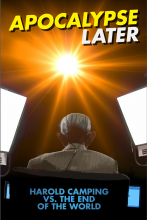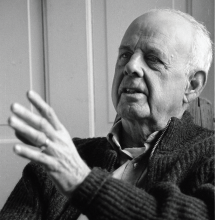Culture

Vampire Weekend are a little like a college-educated version of the rich young ruler in Mark 10. I say a little because, despite the fact that they have gotten flack for being “privileged, boat shoe and cardigan loving Ivy League graduates,” the New York-based foursome actually probably aren’t as wealthy as skeptics think, and the late 20-somethings probably haven’t been as straight edged as the rich young ruler. I mean, they’re rock stars. And even though they went to Columbia University, rock stars aren’t widely renowned for their moral rigidity.
But on Vampire Weekend’s third album, Modern Vampires of the City, which was released last month to critical acclaim and commercial success, we find lead singer Ezra Koenig asking honest questions of God, much like the young ruler.
On this album, the third in what Koenig sees as a trilogy, Vampire Weekend manage to mature their poppy, eclectic sound, drawing from all sorts of genres and international songs — as they normally do — but also exploring deep questions of morality, love, faith, and belief in complex ways.

Days before President Barack Obama's high-profile speech on drones and U.S. counterterrorism efforts, Sojourners sat down with investigative reporter Jeremy Scahill to take an inside look at U.S.-led covert wars and the drones that have become an integral part of our global “war on terror.”
His thesis?
"After years of traveling in these countries, I really believe that we’re creating more enemies than we’re killing.”
In some respects, drones are simply a new tool of old empire. Scahill, author of Dirty Wars: The World is a Battlefield and producer of the documentary of the same name, now in theaters, calls this an "unending war ... being legitimized under a popular Democratic president, who is a constitutional lawyer by trade.”
Indeed, within five years, the Bush administration's invasion of Iraq for terrorist attacks the country did not commit has transformed under the Obama administration into pre-emptive assassinations halfway around the world, for crimes citizens have not yet committed. The result, Scahill suggested, is our collective complicity to “unending war.”

Despite the spiritual strengthening afforded by my monastic experience, this first episode of the show gave me a clearer picture of my inner, ongoing conflict. And this is what I see: in the midst of real life, when the motorcycle engines are lit and the race is on, I want to win. Regardless of what I read in the scripture about establishing your worth in God’s unique, creative expression and what I learned from my soul-nourishing experience with the monks, it pisses me off to lose.
Yes, there was an arduous journey ahead; and, yes there were people who needed attention. But in the moment, I want to prove myself. I’ve seen this so often in my life — when my connection with God grows cold, the endeavor becomes more about my performance and less about God’s presence.
We compete to determine our strengths and weaknesses, not to determine our value. I understand that. I think only a Jesus-grace experience can finally answer the value question. But in real life I’m not there yet. I still struggle with the intersection of my faith in Jesus and my fierce competitive nature. I make more out of winning (or losing) than my faith warrants.
In Latin, the word competition originally meant “to strive together or to come together toward a common goal.” In that sense, the team had come together in a spirit of true competition. Despite any egotistical desires, we grew stronger and engaged the mission as one — each of us better for the competition. And, though I don’t have it all worked out yet, I continue to trust The Great Storyteller — there is yet much grace for a fierce competitor and Whiskey Priest.

A couple of weeks ago I posted about Mumford and Sons. I suggested that the Wednesday concert was, for me, a festival of devotion. Friday's concert, however, was something else. It was an eschatological event. Not transcendent, though others have used that word to describe it, but immanent, apocalyptic, eschatological. There we were gathered all in one place, as the Bible story goes, and the place exploded. Cathleen said more than once that the Holy Spirit was present. I love it when shows differ from night to night. I love it when the audience brings something new. I also wonder how such a noticeable distinction at a concert can be a helpful reminder for all of us who plan liturgies.
My wife is an actress. She will do the same show five or six times a week for six to eight weeks. The same play. Every night. But what she will also say is that it is never the same play every night. Actually, she has said that if you do it right it should never be the same piece twice. There is no such thing as a repeat performance if one understands repetition is not exact duplication.
Similarly, a live concert is not a track on a CD. One does not show up to a concert and press "play." No, it is a singular performative event. Even when, as with Mumford and Sons, the set list is similar and the choreography (yes, even Mumford and Sons have a couple of staged bits) is the same, the concerts still feeldifferent. Why? Well lots of reasons, but mostly because they are different.

The ONE Campaign, co-founded by music legend Bono of U2, has launched a new platform to promote global messages of social justice, women’s rights, and putting an end to apartheid, war and poverty — just to name a few.
The campaign, agit8, features new covers of famous protest songs throughout history by contemporary musicians ranging from Mumford & Sons to Greenday.
With the stated goal of ending poverty by 2030, agit8 is timed to coincide with the upcoming G8 summit next week. Noting the impact protest music has had on American history, agit8 encourages artists to “get on their soapbox” and amplify “the voices of those who spoke up for social change throughout history.”

Fred Rogers, the man behind the long-running Mister Rogers Neighborhood children’s show, died 10 years ago, but his influence is still felt deeply here, the city he called home.
This past week, Pittsburgh Theological Seminary devoted its summer leadership conference to insights from his life and work.
The conference drew an eclectic mix of participants, including psychologists and social workers, educators, clergy, and laity.

For thousands of years, select groups of Christians have thought their generation was Earth’s last. Even the Apostle Paul thought Jesus would return in his lifetime. But Paul didn’t have the audacity to pinpoint an exact date for what we call the Rapture. Harold Camping, on the other hand, did.
Apocalypse Later: Harold Camping vs. The End of the World a new documentary that premiered June 8 — exposes wrongful and conflicting beliefs about Jesus’ return by sharing Camping’s concrete opinions of those who didn’t follow his beliefs of the apocalypse. Declaring their spot in hell, Camping was certain that those who didn’t follow his apocalyptic views would spend eternity in damnation.
Apocalypse Later tells the story of Camping, a man who had to let go of his pride and face the reality of joining the dozens of others who have wrongly predicted the end of time.
In the documentary, historian and New Testament scholar Loren Stuckenbruck refers to the apocalypse as a “literary genre,” a “mode of thought,” and “a social movement.”
The film is emotional and shocking, contrasting the scary, more literal interpretations of fundamentalist Christians with the more nuanced hermeneutical approaches of academics like Struckenbruck. The juxtaposition reveals that the tensions and battles that Christians face might not be against those who will be “left behind,” but rather between Christians themselves.

If I were a tree
I would like to be
A giving tree.
Leaves a peaceful green,
Birds could sit and sing,
Children laugh and swing
Upon my branches.

WITH SO MANY of our sacred institutions collapsing from within, it was a relief to hear that all charges have been dropped against an Elvis impersonator from Mississippi, thus sparing his worthy avocation from disrepute. Paul Kevin Curtis had been accused of sending poisoned letters to officials in Washington, D.C., but FBI officials soon came to their senses and realized that anyone who spends time impersonating a celebrity who’s definitely left the building probably couldn’t make a salad dressing with vinegar and oil, much less extract lethal chemicals from exotic plants.
Ricin was the poison in question, and seems to be the current compound of choice for disgruntled letter terrorists. Before that it was anthrax, an easy-to-produce material which, as it turns out, is what happens when you make salad dressing and get the ingredients wrong. A little too much balsamic, a couple nosy neighbors, and pretty soon the FBI wants to chat.
Fortunately, this man was absolved of all wrongdoing, guilty of nothing except the single act that sets him apart as a hallowed foundation of our society, the one institution that has consistently contributed to Americans’ self-esteem. Because as long as there are Elvis impersonators around, the rest of us will always feel happy and fulfilled. All of our important life decisions—some made in haste, others made in desperation, and each one now regretted—seem steadfast and well-considered, because they have kept us from going down the path of a celebrity impersonator.
INTRIGUING AND believable characters are part of what makes Janna McMahan’s new novel Anonymitya memorable read. Through the story, which is set in Austin, Texas, the author provides a well-constructed and evenly paced plot that brings to light critical themes around home and homelessness.
Early in the story we discover classic contrasts between the two protagonists. Lorelei is a young, homeless runaway whose daily grind revolves around finding food and a warm, safe place to sleep, while Emily’s major mission centers on branching out from her bartending job to take up a more artistic endeavor as a photographer. One buys organic greens from the high-end Whole Foods Market, while the other seeks sustenance in restaurant dumpsters.
This interesting juxtaposition of characters reels us in. But as we swim through the thickening plot, we discover the startling similarities between the two: Lorelei’s rebelliousness and grit compared to Emily’s disdain for the superficial lifestyle of big-box shopping and Corpus Christi vacations; Lorelei’s refusal to seek help and get off the streets weighed against Emily’s desire to break from the overindulgence she grew up around. As Emily’s mother, Barbara, observes, “Emily liked the frayed edges of life, a little dirt in the cracks.” It should come as no surprise that Emily takes an interest in Lorelei’s hardscrabble existence.
So much about Lorelei remains a mystery, which serves to add tension and compel the reader forward. We sense she is searching for something, and there’s no way to prepare for the powerful punch McMahan delivers when we discover what Lorelei’s quest is about.
TWO YEARS AGO, Jeff Chu found himself at a crossroads. Like many gay Christians, he felt disconnected—condemned by a wide swath of his fellow believers because of his sexual orientation, questioned because of his faith by some in the LGBTQ community who have been pushed out of the church by the words and actions of many Christians. To top it off, there was that lingering doubt, so common among those raised in evangelical households: Does Jesus really love me?
To answer that question, Chu—an award-winning writer for Time, The Wall Street Journal, andCondé Nast Portfolio and the grandson of a Southern Baptist preacher—took off on a yearlong cross-country pilgrimage, “asking the questions that have long frightened me.” What he encountered was a divided church, “led in large part by cowardly clergy who are called to be shepherds yet behave like sheep.”
Many of the pastors Chu contacted for the book refused to speak with him, citing their suspicion of him as a member of the so-called “‘liberal media elite’” or stating bluntly that engaging on such a controversial issue might jeopardize funding for a pet project. After speaking with Richard Land, then-president of the Ethics & Religious Liberty Commission of the Southern Baptist Convention, and David Shelley, a Baptist minister from Tennessee affiliated with the Family Research Council, Chu concludes that they “devote much more time talking about legislation than about love.”
Then there are those he interviewed who are known more for screaming than talking. In meeting with members of the infamous Westboro Baptist Church, Chu does not shy away from controversy—or his own fears. “Some nights before my departure,” he recalls of the days before his trip to Kansas, “I had nightmares, and many mornings I’d wake with my jaw tight and teeth clenched.” His encounter with Rev. Fred Phelps, the grizzled, homophobic pastor of the church, is perhaps the most riveting of the book, culminating in a surreal, grudging offer of friendship from Phelps.
ETHICS ASKS the questions: What is right to do? How do we know? David P. Gushee puts the concept of the sacredness of human life at the center of his moral reasoning. A professor of Christian ethics at Mercer University in Atlanta, Gushee has given us a work that is an important milestone on the road of constructive Christian ethics.
In this book Gushee has set himself a large and ambitious goal. He writes, “I am proposing that, rightly understood, a moral norm called the sacredness of life should be central to the moral vision and practice of followers of Christ.”
He seeks to ground this moral norm in scriptural authority and in the Christian tradition at its best. His survey of scripture and of Christian history is truly impressive, considering most of the major elements of the Christian theological and ethical traditions, including the current thinking of liberation theology. He demonstrates knowledge of the feminist critique of scripture, and he at least mentions eco-feminism. The bibliography alone is worth the price of the book.
Moreover, Gushee also considers such important Enlightenment thinkers as John Locke and Immanuel Kant. He devotes a chapter each to German philosopher Friedrich Nietzsche and to the Nazi desecration of human life. There is much food for thought here.
For me, however, the book is primarily descriptive. And it does not provide an explanatory framework to help us understand why scripture and the Christian tradition have led the way in both the recognition of the sacredness of human life and in the violation of this holiness. It would have been helpful for Gushee to give us a brief discussion of Ernst Troeltsch, who in his two-volume The Social Teachings of the Christian Churches enables us to see that the line of demarcation between the church and the world is porous to the point that there is always interpenetration between the two. Church teachings leaven and flavor the moral thinking of the world outside its doors while the world’s often destructive ideologies come to church every Sunday and sit down on the front pew and sometimes preach from the pulpit.

HOW IS IT that a miniseries based on the Good Book could evoke sectarian and violent notions of the Divine that would have seemed backward to some even back in the era of melodramatic biblical epic cinema? The History channel’s The Bible, like so much of so-called “religious pop culture,” seemed to be the product of good people trying to do a good thing, but at best putting the desire to convey a particular message ahead of making the best artwork for the medium.
The politics of The Bible seemed to perpetuate an “us vs. them” lens. It left me wishing for a treatment of scripture presented from the perspective of the marginalized, instead of a portrayal of “victory” as being the deaths of people considered different. Couldn’t someone make an Exodus movie about Moses’ neighbors—you know, the ones who saw God’s favor rest on the boy next door, while their son was killed by a psychopathic king? Or one focused on the myriad people groups considered “unclean” and worthy of genocide at the hands of those who claim to speak for God? Or a rendering of John’s Revelation that understands it as a poem about remarkable beginnings, the battles of the human heart, and a love willing to remake the world to set us free from the traps we’ve laid for ourselves? You don’t even have to be that controversial—can’t someone just make a decent movie about Ruth or any of the many cool women in the gospels?

WENDELL BERRY was on stage being interviewed by Bill Moyers when the old Baptist minister (Moyers) asked the unchurched Christian (Berry) about his faith. “The world is maintained every day by the force that created it,” Berry intoned solemnly. In the Old Testament, he noted, “Elihu says to Job, if God gathers his breath, all creatures fail. All creatures live,” Berry emphasized, “by breathing God’s breath, breathing his spirit. It’s all holy—the whole shooting match.”
At 78, Wendell Berry shows no sign of failing, either in his breath or his spirit. But the Kentucky writer-activist-farmer is already enjoying a sort of immortality as the namesake of a degree program in ecological agrarianism at St. Catharine College. In April, that small Catholic institution in Springfield, Ky., hosted a conference titled “From Unsettling to Resettling: What Will It Take to Resettle America?” in honor of the 35th anniversary of Berry’s landmark book, The Unsettling of America. The interview with Moyers was part of the conference program.
Drastically oversimplified, the thesis of The Unsettling of America held that two types of Europeans came to America. Elsewhere, citing his teacher Wallace Stegner, Berry has called them the “boomers” and the “stickers.” The boomers were the unsettlers. They moved into the New World, cut down the trees, extracted the minerals, used up the land, and then moved on in search of new places to despoil. The stickers, however, settled into a place and made it their own. They cooperated with the land and the local resources to make a life and a livelihood that could be sustained over generations. Our problem, Berry contended, is that in America the boomers, backed by the power of money, have for too long set the agenda and won most of the fights.

Star Trek: Into Darkness is a fascinating and complicated story that is well worth watching. Instead of providing a summary, I want to explore three related aspects of the movie: sacrifice, blood, and hope for a more peaceful future.
Live Long and Prosper – The Sacrificial Formula
In a reference to my favorite Star Trek movie, Star Trek II: The Wrath of Khan, the current movie’s Spock (Zachary Quinto) restates the sacrificial formula: “The needs of the many outweigh the needs of the one.” This formula has generally been used throughout human history to justify sacrificing someone else. As René Girard points out, from ancient human groups to modern societies, whenever conflicts arise the natural way to find reconciliation is to unite against a common enemy.
Of course, there’s a lot of this going on throughout the Star Trek franchise. One conversation in Into Darkness explicitly points this out when Kirk (Chris Pine) unites with his enemy Khan (Benedict Cumberbatch), and explains it to Spock:
Kirk: The enemy of my enemy is my friend.
Spock: An Arabic proverb attributed to a prince who was betrayed and decapitated by his own subjects.
Kirk: Well, it’s still a hell of a quote.
A Terrible Thing to Waste
Many U.S. children living in poverty are further penalized by struggling public schools. Nicole Baker Fulgham, former vice president of faith community relations at Teach for America, offers passionate, practical solutions in Educating All God’s Children: What Christians Can—and Should—Do to Improve Public Education for Low-Income Kids. Brazos Press
Holy Disruption
The documentary Bidder 70 tells the story of a different kind of civil disobedience: Tim DeChristopher helped save 22,000 acres of Utah wilderness by outbidding industry figures at a disputed Bureau of Land Management oil and gas lease auction, with no intention of paying or drilling. www.bidder70film.com
WE OWE A lot to Anne-Marie Slaughter. Last summer, the Princeton University professor’s Atlantic article “Why Women Still Can’t Have It All” kicked off an overdue, protracted national-scale debate on the difficulty of juggling the demands of professional success and committed parenting, the likes of which we haven’t had in a while. Shortly after Slaughter’s polemic hit newsstands, Marissa Mayer, just 37, was named CEO of Yahoo!, becoming the youngest CEO of a Fortune 500 company at the time and stirring controversy when she revealed that she was seven months pregnant. (Months later, she banned telecommuting companywide and was sharply criticized by some as being “anti-parent.”)
Then, Facebook COO Sheryl Sandberg got in on the action, publishing in March the ambitiously titled Lean In: Women, Work, and the Will to Lead. In the following months, it sat at the top of bestseller lists, with staggering sales triggering multiple printings. Sandberg, one of the wealthiest women in the world, donates all related profits to her newly established nonprofit, also called Lean In, encouraging women to form consciousness-raising Lean In Circles, in which they’ll discuss money and maternity.
Suddenly, there was a lot of estrogen in the air. A year into this cultural conversation, we’re still trying to make sense of what it all means.
First, a caveat. I don’t know anyone, woman or man, naïve enough to believe that any of us can have whatever “it all” entails. When Slaughter’s indignant article set off a firestorm about the impossibility of work-life balance, I was happy (as I always am) to witness a (mostly) thoughtful discussion unfold. But I was and still am miffed that anyone thinks women were sold a false bill of goods. Who was that mightily influential yet terribly mysterious person who promised us everything we ever wanted? How did we let him (it must have been a “him”) get away with spreading such a vicious lie, and why do we allow it to persist?

From the midst of the nether
world I cried for help.
—from the Book of Jonah
A gray whale blows off Cardiff Beach,
just beyond the glamour homes,
boutiques, and drive-thru windows,
valet service and all-u-can-eat sushi.
I want to swim out and be swallowed.
Jonah’s whale wasn’t Ahab’s, all
tripey white and peg-toothed, but
a strainer of phosphorescent shrimp,
which lamped the reeking gut, like
fireflies we swallowed once, in jars.

Is there anything morally redeeming about Game of Thrones? Does the hit HBO series even have a moral vision?
The show is certainly entertaining, almost addictively so, and as Game of Thrones wraps up its third season on Sunday, the ratings reflect that popularity: a record of more than 5.5 million viewers have followed the ruthless struggles for power among the teeming clans of Westeros, the medieval-looking world created by fantasy novelist George R.R. Martin.
That success has also guaranteed that the show will be back for a fourth year of mayhem and passion, swords and sorcery, despite this season’s many violent endings. Or, as one tweet put it after the bloody penultimate episode: “Why doesn’t George R.R. Martin use twitter? Because he killed all 140 characters.”
But therein lies the moral problem for some: The appeal of the series seems bound up in the senseless violence and amoral machinations – not to mention the free-wheeling sex – that the writers use to dramatize this brutish world of shifting alliances and dalliances.
That, in turn, has prompted intense debates about whether Christians should watch Games of Thrones at all, or whether the show’s only possible virtue is depicting how the world would look if Christ had never been born – or what it could look like if Christianity disappeared tomorrow.
WHEN MY DAUGHTER, Jessica, was 7 years old, some of her best friends had American Girl dolls, so of course she desperately needed one as well. We asked three or four family members to chip in—these were expensive dolls—and got her one for Christmas.
Her doll, “Addy,” came with a story, as did each in the American Girl line. Addy and her mother had escaped from slavery in the American South, and they “followed the drinking gourd” north to Philadelphia, where they were eventually reunited with the rest of Addy’s family. It was a gripping story, especially for a 7-year-old. And the fact that Addy was about my daughter’s age made it all the easier for her to connect.
“It wasn’t so much that I learned ‘facts’” about slavery and race from the Addy stories, Jessica, now 27, told me recently, “but they made it all more personal. Addy was young, like me—I could relate to it.”
Other women who grew up with the dolls echoed that sense of connection with the various American Girl stories. Janelle Tupper, campaigns assistant at Sojourners, was around 7 when she received the “Kirsten” doll, a Swedish immigrant to the U.S. “My most distinct memory from the stories was that, on the boat, her best friend dies of cholera,” Tupper said. “Reading that passage was pretty devastating to me as a kid.” Other books in the American Girl series addressed issues of the day, from child labor to women’s suffrage. And while Tupper said she wasn’t aware as a child of the social justice themes in the stories—“I was just imagining life in the different time periods through the eyes of a character I identified with”—she now sees the series as addressing “societal change in terms that an 8- year-old can understand, often told through the characters’ friendships and family stories.”